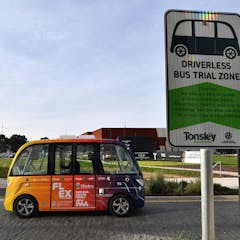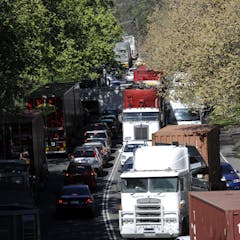
Articles on Driverless transport
Displaying all articles

Amid bus route cuts and rail strikes, can the answer to our future public transport needs be found in the hi-tech prototypes being trialled around the UK?

The autonomous vehicle revolution was, according to its proponents, meant to have transformed daily travel by now. But they underestimated the task of developing a safe, truly driverless vehicle.

Self-driving vehicles that constantly roam the streets looking for passengers could overwhelm cities. But, if kept in check, these vehicles could be useful for improving urban transport.

Scenarios based on a survey of Adelaide commuters and analyses of traffic flows show it’s possible the congestion could get worse in the transition to driverless vehicles.

New anti-sickness technology is needed for driverless cars to deliver on the promise of letting us read, work or watch films while we travel.

To maximise the benefits and limit the costs, the use of autonomous vehicles should be pooled and their access to the city restricted.

Far from setting us free, autonomous vehicles are set to enable new forms of surveillance and oppression.

Trains and trams get most attention, but ‘tweaking’ bus transit can transform cities. Buses can be more cost-effective and deliver better service, especially for small to mid-sized cities.

Airplanes could be safer with technology at the helm. A key sticking point is human opinion.

Uber, Tesla and Waymo (Google) are leapfrogging traditional car makers like Ford, VW and General Motors when it comes to self-driving cars.

Self-driving, shared, electric vehicles and increasing urban density represent four disruptions that will transform city life. But a transport utopia isn’t a guaranteed outcome of their interactions.

Traditional car manufacturing may have gone from Australia with a loss of jobs, but one senior figure in the motor industry sees a potential for new jobs thanks to driverless cars.

Human-operated cars affect health in three main ways, all negatively. How might driverless cars be healthier?

It’s clear autonomous vehicles will disrupt our cities, their land use and planning. Whether they make urban life better or worse depends on how well we anticipate and adapt to their impacts.

Not everyone agrees on how artificial intelligence will change the way we live. But it’s not all doom and gloom either.

There’s every chance that, if mismanaged, driverless vehicle technologies will entrench the ills of car dependency.

A project set up north of Melbourne’s CBD aims to create a living laboratory for developing a highly integrated, smart, multimodal transport system.

There’s a new driverless bus on the streets of Las Vegas. It could herald the future of our transport networks.
